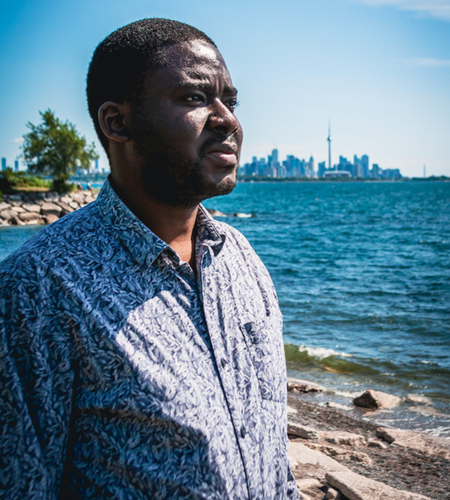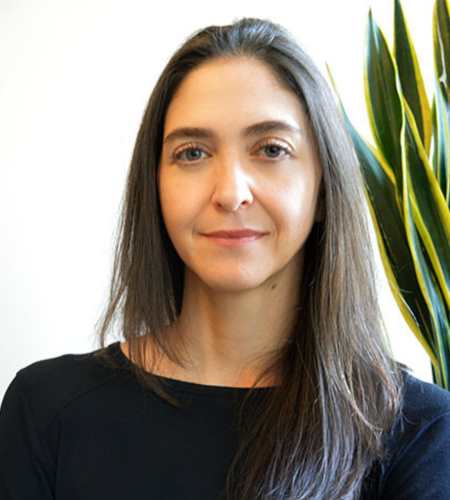Introducing the 2023-24 Geoffrey F. Bruce Graduate Fellows in Canadian Freshwater Policy
Samson Abioye, PhD student

Samson Abioye is a PhD student focused on the interface of environment, health and water policy. His interdisciplinary research addresses the growing threat of contaminants of emerging concern (CECs) in Canada’s waters and focuses on their removal and the policy and regulatory reforms required. Inspired by the increasing concern of CECs which are yet to be fully regulated by Canadian drinking water standards, Abioye’s research seeks to use a science-policy approach in addressing this major water policy challenge.
Abioye’s research documents the limitations of conventional water treatment plants in removing this class of contaminants, which includes pharmaceuticals and personal care products, pesticides, BPA and PFAS. The continuous ingestion of these contaminants through drinking water can impart endocrine-disrupting effects in humans and the presence of pharmaceuticals (drugs and antibiotics) in drinking water pose significant threats and costs to public health. While scientific knowledge and new technologies are required for the removal of CECs from water, policies and regulatory reforms are critical to provide a clear path towards tackling the issue head-on. Abioye’s research has involved comparative policy analysis focused on CECs policy and management strategies in different jurisdictions including the U.S.A., Europe and Australia. He has completed a review of drinking-water quality policies and guidelines by Health Canada, Environment and Climate Change Canada, and the Canadian Council of Ministers of the Environment. Abioye is also currently investigating the health-care system and environmental costs of leaving these chemicals unregulated, providing critical scientific evidence supporting the need for national regulations, and writing about the need for a regulatory requirement for full disclosure of chemicals used by various industries in Canada.
The final stages of Abioye’s PhD research focus on policy implications and communications of his research on the need for national policies and regulations related to CECs. Abioye aims to effectively communicate his research outcomes to spur policy makers to action. He has published op-eds on the topic and his manuscript “What Actions Should Canada Take to Address the Issue of CECs in Water?” is currently under review with Water Policy journal. With funding support from a Geoffrey F. Bruce Fellowship, Abioye will be able to focus on policy communications and strengthening policy capacity in Canada to address these water-related public health threats. Abioye is also a Vanier Scholar and has received many awards for his high-impact research at the science-policy interface.

Diana Paredes is an Environmental Applied Science and Management MASc student at Toronto Metropolitan University. After completing her bachelor’s and master’s in environmental science in Ecuador, Paredes worked for the country’s Ministry of Environment, focusing on the analysis of environmental impacts, policies and regulations of the mining and oil industries. Upon relocating to Canada, she actively engaged in volunteer initiatives at the Toronto Region Conservation Authority and completed a certificate in Environmental Management at the University of Toronto. There, she also worked as a research assistant, conducting research on watershed policies related to non-point source water pollution where she developed a keen interest in water policy at all levels of government. From this work, she co-authored two papers on models, policies and guidelines for best management practices related to addressing chronic water pollution in Lake Erie.
Paredes’ passion lies in the fusion of scientific knowledge and socio-economic aspects of water governance to inform robust regulatory frameworks for safeguarding water resources for all life forms. Her master’s research focuses on groundwater policies and private wells, an important policy gap and critical source of freshwater that has been neglected by policy makers. Groundwater is a drinking-water source for nine million Canadians and 1.5 million Ontarians. Her research focuses on analyzing groundwater policies for private wells in Ontario and examining and comparing policy and regulatory frameworks governing groundwater in Canada and the U.S. to identify similarities, disparities, strengths, weaknesses and policy insights. Paredes aims to provide policy recommendations to address these gaps, including a focus on the need for more frequent groundwater water quality testing and monitoring related to the presence of contaminants not commonly assessed. She aspires to effect positive change by advocating for enhanced groundwater policies and contribute knowledge and policy recommendations to protect this invaluable and often invisible water source. Her research is also timely given the establishment of the Canada Water Agency and the modernization of the Canada Water Act, both of which must prioritize groundwater.
Paredes is also a member of the Urban Water Student Leadership Committee at TMU and has worked with Swim Drink Fish Canada, a charitable organization that fosters public engagement and advocacy related to water policy in Canada. Her ultimate goal is to draw attention to the critical significance of groundwater policy, not just within academic circles but also among the wider public and policymakers. The Bruce Fellowship will allow Paredes to work towards attaining this goal and making an important research and policy contribution to groundwater policy in Canada.